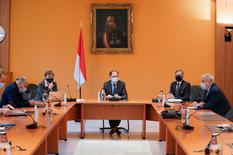- Homepage
- The Economy
- Analysis and Statistics
- News
- Presentation of Economy Bulletin for Q3 2020
Presentation of Economy Bulletin for Q3 2020
Monaco Statistics (IMSEE) presented the Principality’s Economy Bulletin for the third quarter of 2020 before a press audience on Tuesday 15 December.
Surrounded by Government ministers Jean Castellini and Didier Gamerdinger, Monaco Statistics Director Sophie Vincent explained that “the Monegasque economy, like the global economy, continues to feel the impact of a health situation that remains precarious and uncertain. The data now includes the summer period, which has enabled some indicators to recover. The figures for the year as a whole remain significantly down, however, having been adversely affected by performance in the second quarter of 2020.”
Since January, the Principality’s revenue has dropped 11.5% compared with the same period in 2019, losing nearly €1.2 billion. It has nonetheless recovered to the same level as in 2016–2017, amounting to almost €10 billion. Two sectors are holding up: scientific and technical activities, administrative and support services; and real estate activities. The accommodation and food service sector has, on the other hand, seen its revenue cut in half.
There has also been a sharp decline in wholesale and retail trades, while the other service activities sector has experienced a significant drop of nearly 50% in revenue, due to the reduction in sports and recreation activities, gambling and betting activities, and arts and entertainment activities.
Foreign trade fell to a level slightly below that of 2015. Imports were down by half, while exports proved more resistant. The main decline was in transactions outside the EU, which dropped by 47%.
At the end of September 2020, there were almost 4,500 fewer jobs in the private sector than in September 2019 (-7.7%), an improvement compared with June 2020. Currently, 540 jobs are completely furloughed (0 hours worked). The number of hours worked has fallen by a total of 11 million (-16%) over the year as a whole, but is up by 33% compared with the second quarter of 2020. The strengthened provisions for total temporary layoff (CTTR) have helped to cushion the decline, as Didier Gamerdinger, emphasised, reminding the audience that “the Government has been committed to maintaining business and employment since the beginning of the health crisis. By the end of the year, it will have devoted nearly €110 million, or 10% of its budget, to the various support programmes available, including CTTR.”
Finally, thanks to the measures introduced to support businesses, there have been fewer closures this year than in 2019 (328 compared with 374) and the balance (new businesses started compared to businesses closed) remains positive, despite a marked decline in new businesses started during September.
Jean Castellini concluded the presentation by noting: “what is important today is the recovery plan, with some immediate impacts, such as the injection of €5.5 million into the economy through the Red and White Fund and the Carlo app, the continuation of CTTR to take the pressure off businesses, and the Economic Recovery Support Commission (CARE).”
All indicators, along with the full Bulletin, can be found at www.imsee.mc .










